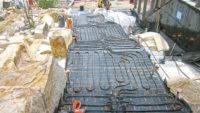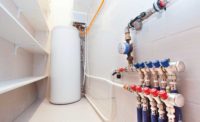Embassy Suites in Portland, Oregon, consistently wins high reviews online — many of which give the enthusiastic thumbs-up for the 276-room historic hotel, an architectural masterpiece built in 1912.
One review said he had two pet peeves: An uncomfortable bed (the bed there passed with flying colors) and the lack of hot water, or extreme delivery temperature swings.
Apparently, he was once told by a hotel operator at another hotel that “technical problems” made it impossible for him take a warm shower for an hour or more. He went on to say that downtown Portland’s Embassy Suites provided hot water fast, and plentifully. He rated them 5 of 5 stars.
Two years ago, hotel managers smartly decided to install a digital mixing station for their domestic water system.
Water temp: what’s the big deal?
For many years, according to Embassy Suites chief engineer Phil Cox, domestic water was heated in three, 1,500-gallon tanks through copper tube bundles that exchanged Btu from two steam boilers. No thermostatic mixing was involved.
“Heat was moved directly over from the boilers, on priority, into the big steam bundles to meet hot water demand by room guests,” Cox explains. “This was the way kitchen, laundry, janitorial and guest-room water was heated for 20-some years.
“We realized that there were potential problems to the temperature swings that guests experienced. We weren’t comfortable with that inconsistency, even though we were fairly successful at maintaining 120 to 125°F water temps leaving the tanks.”
Cox notes there also was the risk of microbial growth in the tanks if storage temps went too low.
“And, finally, if we stored water at higher temps to eliminate the risk of microbes in the big storage tanks, we created the risk of too-high water temperatures at points of use — sinks and showerheads.”
Cox explains that news of digital mixing technology — ideal for hospitals, nursing homes and casinos, for instance — was available, and well-suited to hotel retrofits, too.
“Considering the routine maintenance and ongoing challenge of constantly fine-tuning our efforts to keep guests comfortable — and it was no small challenge, given the lack of precise control of storage temperatures — we made a proactive decision to eliminate all problems with one solution — digital mixing,” he continues. “Fortunately, our manufacturers rep firm was eager to help.”
Sales engineer Luke Erickson with manufacturers rep firm, Stone-Drew/Ashe & Jones based in Seattle with offices in Vancouver, Spokane and Kennewick, Washington, met with Cox and others at the hotel. While visiting the hotel, Erickson also discovered another facet of the challenge at the hotel: Pressure differential.
“The expected delivery pressure from the municipal water supply was 80 psi,” Erickson says. “In reality, several times a day, delivery pressures dropped to 38 or 40 psi [chiefly during peak use, city-wide] — at times when hotel managers most wanted to maintain proper pressure and temperature settings.”
Enter digital mixing
“We wanted to solve a problem before it grew,” Cox adds. “We were glad to learn the task could be completed with the use of new technology, and with relative ease.”
Erickson introduced Cox to the Powers, a Watts brand, IntelliStation, assuring him that the system was capable not only in managing consistent temperatures throughout the hotel’s entire water system but, by design, responds to municipal pressure fluctuations based on their impact to water temperature change.
“It’s one of the key functions of contemporary digital mixing controls,” Cox says. “They’re equipped with technology that continually monitors temperature, flow and pressure. The digital controls make constant adjustments based on the differential between mixed outlet temperature and pre-programmed outlet set point. ”
Simple thermostatic mixing valves can’t do that. Large pressure and temperature swings are difficult to manage, requiring that they be reset routinely, and that systems be rebalanced.
Portland-based Lovett Services won the installation contract. As one of the area’s leading commercial/industrial plumbing firms, their pros are familiar with the challenge of decommissioning and draining-down entire hotel-sized plumbing systems.
To avoid downtime to the greatest extent possible, they did as much prefabrication of piping to and from the digital mixing station as possible. Most of the onsite work was completed in the middle of the night to reduce downtime inconvenience.
Lovett technicians were able to install the digital mixing station in about four hours’ time.
“The technology went right to work. Shortly after we completed the supply and return connections, the system did an awesome job of controlling water temperature to all points of use in the hotel,” he says.
Now, storage temperatures are set at 150°, and supply temps are consistently delivered at 125°, plus-or-minus 2°.
“Having that level of consistency within a big, old hotel is a real accomplishment,” Benson notes.
Digital mixing + recirculation
Designers of large plumbing systems are now discovering that a digital mixing system is the most effective way to deliver properly mixed water throughout a hot water recirculation loop.
For even greater control, these systems can be installed as part of an ASSE-compliant water distribution system, including point-of-use mixing valves at each fixture in the plumbing system. This ensures hot water storage temperatures can be kept at levels lethal to pathogens, then mixed to safer temperature levels both at points of distribution and use.
Other key advantages to digital mixing include:
- Supports energy conservation through more efficient water temperature management—and, in turn, reduces energy costs;
- Integrates with building automation systems to support integrated building management.
- Supports consistent delivery of hot water on-demand wherever and whenever it is needed, in accordance with building codes;
- Systems are field-configurable without the need for a laptop or special software and can be integrated into a building automation system to allow remote monitoring and control of water temperatures;
- Rather than experiencing the constant headache of boiler room problems and system troubleshooting, Cox and his staff merely schedule routine maintenance checks on a six-month cycle; and
- With digital mixing, hotel facility managers have yet to receive a hot water complaint — with hot water arriving at taps and showers quickly and at a safe, consistent temperature.
“When guests are happy, and especially if they’re offering online reviews with multiple stars, facility engineers, hotel managers and building owners are happy,” Cox concludes. “We can’t ask for much more than that.”







